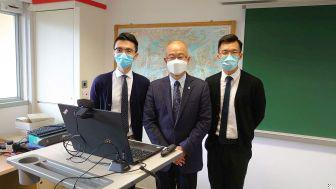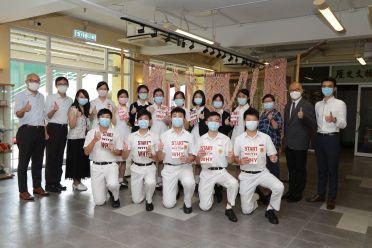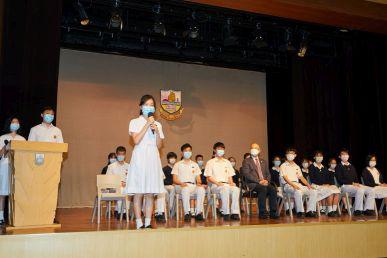Nurturing Students’ Self-directed Learning at School-wide / System Level
Nurturing Students’ Self-directed Learning at School-wide / System Level
Author: Dr Yip Chi Sio (Principal), Mr Tsoi Ka Wing, Mr Mak Ying Yin, Munsang College

From left to right: Mr Tsoi Ka Wing, Dr Yip Chi Sio (Principal), and Mr Mak Ying Yin
Gifted Education Sharing (Academic, Affective, Authentic)
In the educational context of the 21st Century, gifted students are provided with many chances to accelerate and deepen their learning on both academic and non-academic fronts. Although there are many opportunities for them to realise their potential in different areas, it is found that some gifted students are stressed as they are invited by various stakeholders to participate in various activities and programmes. In addition, some of them have lost their passion and direction throughout the journey of knowledge pursuit. Hence, being a self-directed learner is important for gifted students as it is the key for them to become sustainably passionate and determined in exploring and realising their potential.
Implementation of Gifted Education – Whole School Approach
In order to ensure the three-tier implementation model for gifted education is considered and executed at a cross-subject level and in non-academic areas, the school administration has to guarantee every member of the teaching staff has a certain level of understanding of gifted education. In Munsang College, all teaching staff have completed the online foundation course offered by the Education Bureau to understand the features of gifted students and ways of incorporating gifted education in their lessons. The three-tier implementation for gifted education has been included in the school annual plan and report so that subject and department heads would have a stronger awareness to incorporate gifted education elements in their plans. For example, various tiered assessments and bonus questions are included in daily assessments and examinations. The Co-curricular Activities (CCA) Committee has also launched the Diverse Talent Mentorship Programme to provide mentorship and guidance to students gifted in visual arts, music, and sports. The Whole School Approach (WSA) which includes all teaching staff in implementing gifted education can hence guarantee the provision of various activities and programmes to gifted students while teachers are ready to provide guidance and support for the gifted students to explore and realise their potential.
Provision of Affective Education to High-achievers
Self-directed learners are characterised by their high level of self-initiative, motivation, passion and determination to excel in their areas of interest. It is common for gifted students to be perfectionists and their motivation and determination may not be easily sustained when they encounter challenges and difficulties. They may give up chances or refrain from participating in competitions in order to avoid potential failure. On the other hand, some gifted students do not understand their life goal and interest and they may be fed up with gifted activities and programmes in different areas. Hence it is important to provide affective education opportunities for gifted students so that they can develop their stress-management skills and understand their uniqueness. For example, mindfulness practices can help them manage stress and let them have self-reflection. Leadership training camps can facilitate team building and cultivate perseverance and determination among participants. Affective education is essential to facilitate the nurturing of gifted students in self-directed learning as it can enhance their self-awareness, self-understanding, and resilience; and encourage them to take a certain level of risk and embrace challenges.
Designing Authentic Learning Experiences for Gifted Students
As the teaching and learning process has been shifted from teacher-centred to student-centred, it is essential to provide gifted students with authentic learning experiences to boost their sense of ownership in learning and pursuit of knowledge. Otherwise, self-directed learners may not be able to maintain their motivation and determination. Activities of the Model United Nations (MUN) carried out in the College will be used to illustrate the importance of design and provision of authentic learning experiences for self-directed gifted learners. The College has participated in local MUN programmes and Harvard Model Congress Asia since 2015. At first, high-achievers were selected to participate in the programmes. Yet it was observed that those high-achievers did not actively participate in the programmes and they could not learn much from it. After debriefing with the participants, it was learnt that they were not particularly interested in the discussion on controversial global issues. The limited learning outcome was not related to the students’ academic ability but the lack of motivation and interest. After evaluation, we encouraged students who were interested in the programmes but might not be academically excellent to join through self-nomination. It is found that students showing strong interest in the programmes are more active and willing to learn and develop their potential. They are empowered to prepare for the competition and find ways to enhance their language proficiency, debating skills and global awareness. This experience shows that authentic learning experiences can maximise the learning outcome by enhancing the motivation of gifted students, hence equipping them as self-directed learners.
Co-curricular Activities amid Pandemic (Aspiring, Articulating, Actualising)
Most of us, as teachers and educators, are familiar with the question words ‘What’, ‘How’, ‘Why’, etc. On numerous occasions, we tell our students what to learn, how to learn and why they have to learn. Learning objectives are essential for lesson plans. In recent years, some teachers show the learning objectives and brief the students at the beginnings and ends of lessons. Students could understand more about the expected learning outcome and the learning strategies to be adopted in the lessons. Such metacognition is conducive to effective learning and teaching in the classroom. On the other hand, when it comes to nurturing students’ self-directed learning, we often focus more on the question word ‘Why’. By telling students why they have to learn, their learning incentives and motivations could be boosted. For gifted students, teachers shall consider asking them why they have to learn instead of telling them why they have to learn. With higher learning capability, gifted students are expected to explore by themselves the meaning behind learning an issue or topic under teachers’ guidance. With the question ‘why’ being resolved in their mind, gifted students would be more likely to initiate and sustain self-directed learning.
Our Principal, Dr Raymond Yip, met student leaders of the previous academic year and presented them each a book Start with Why written by Simon Sinek. Words of encouragement were given to the student leaders and it is believed that they would have a unique learning experience if they could make sense of the adversity and abnormality they faced during the year. At the beginning of the current academic year, the election of student bodies-including committee members of the Student Association and Six Houses-were conducted online. Online campaigns were launched by the proposed cabinets and candidates to promote their plans and proposals. The effort spent on these online campaigns were actually no less than on the face-to-face ones. Student leaders demonstrated their passion and commitment and are now more than ready to handle the challenges ahead of them. The inauguration ceremony for student leaders of 2020-21 was conducted in the school hall without the presence of any audience. The ceremony was recorded and broadcasted to all students during the class teacher period. Student leaders of 2020-21 are well prepared to assume their role amid abnormalities caused by social unrest and the pandemic. The school has nurtured in them the sense of aspiration – the first ‘A’, in hope that they could be self-initiative and exercise their creativity in serving their fellow schoolmates.

Apart from nurturing aspiration among students, the school also prepares various training for student leaders in order to empower them for their roles and responsibilities. This echoes the second ‘A’ – articulation. To observe the EDB guidelines, no physical CCA is allowed amid the pandemic. Leadership training sessions are conducted online via virtual meetings. The Principal provides training to teachers-in-charge of student bodies and the teachers provide training to the student leaders. Student leaders are empowered to adjust the leadership training activities and provide further training to their fellow group members.
Leadership trainings are not limited to a small group of students as we believe that every student shall have their leadership qualities or potentials polished. One of our school major concerns in recent years is to groom our younger generations into dynamic individuals, i.e., to: i) hone students’ self-management and resilience skills, ii) support students with diverse talents to excel in their areas of interest, and iii) nurture students’ global citizenship and awareness of national and global issues. The pandemic undoubtedly disrupts school routines and operations; thus, alternative modes must be explored in order to sustain students’ experiential learning. Opportunities are given to students to exercise their creativity, leadership, teamwork, etc. as far as possible. We believe that students can learn more from doing than from talking. In other words, the school encourages students to implement their ideas after thorough planning, and eventually learn from evaluating the whole process. The ‘I’ in the well-known ‘Planning-Implementation-Evaluation (PIE)’ model is in line with the third ‘A’ – actualisation. Following are some examples of how the school has operationalised major concerns to prepare the ground for students’ actualisation amid the pandemic.
- Honing students’ self-management and resilience skills
A theme talk on positive psychology was held to boost students’ self-management and resilience skills, which are essential qualities that students should possess to handle uncertainties under the pandemic. To cater for students’ developmental needs, the theme ‘Re-orientation – 定位更新’ was chosen for the senior forms while ‘Exploration – 展翅’ was chosen as the theme for the junior forms. To make this theme talk available for all students while observing EDB’s guidelines on social distancing and prohibition of mass gathering, an alumnus who is a clinical psychologist was invited to record a 40-minute video, which was then played to all students during the class teacher period in October 2020. Our students were enlightened with the positive values of life and were equipped with the skills to deal with maladaptive thoughts, especially during the pandemic. Students had interactive sessions with their class teachers after the talk to facilitate mutual communication and understanding, as social bonding is exceptionally valuable when all sorts of social distancing policies are in effect. - Supporting students with diverse talents to excel in their areas of interest
The Theory of Multiple Intelligences proposed by Howard Gardner has been more widely publicised in recent years and is adopted by the Gifted Education Section of EDB and various schools. We believe students are unique and the degree of performance in each intelligence may vary. It is our aim to help students discover and develop their own interests and talents. Such belief is operationalised by the diverse choices of CCA. On the CCA Enrolment Day every academic year, committee members of various CCA groups will set up booths to promote their groups to their fellow schoolmates. Students will enrol in CCA groups of their choice on this day. Committee members of CCA groups will exercise their creativity, adopt various promotional strategies, and try their very best in recruiting members for the groups. The CCA Enrolment Day is a once-in-a-year occasion which provides most students, if not all, with a combination of opportunities to aspire, articulate, and actualise.
The 2020-21 CCA Enrolment Day was cancelled and CCA Online Enrolment was conducted instead. CCA groups committee members replaced their traditional booth promotion with a virtual promotion. Promotional videos were created and uploaded to the school intranet. Students watched the videos before enrolling in various CCA groups during the online enrolment period. These promotional videos were created using various tools, including animations, mosaic, infographic, word arts, etc. We are impressed by the students’ adaptability and creativity.
Regular CCA meetings and activities are also conducted online via real-time meeting apps. The ‘affective’ and ‘cognitive’ components of individual CCAs are emphasised at online meetings, while those involving physical trainings are suspended. Team-building and sense of belonging are nurtured among group members and some corresponding knowledge and skills are also delivered to students via the CCA online meetings. - Nurturing students’ global citizenship and awareness of national and global issues
Ample opportunities have been given to our students to extend their learning beyond the classroom and nurture their national identity and global citizenship. The school hosts American Field Service (AFS) exchange students from foreign countries every year and their active participation in school activities has enriched the cultural ambience. For more than a decade, learning tours with diverse themes have been organised to broaden students’ horizon and nurture their national identity and global citizenship. In response to the pandemic, we have to explore virtual exchange with our sister school in the Chinese Mainland and our partner schools in other foreign countries. In December 2019, we held our first virtual exchange with Vienna Business School. Our F.4 and F.5 cultural exchange ambassadors are also planning a virtual exchange programme with Guangdong Guangya High School to be launched in the first half of 2021. Every little step counts when we are working to sustain and enrich students’ learning in this ‘New Normal’.







